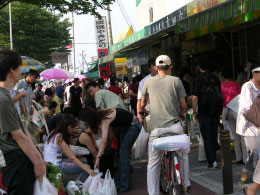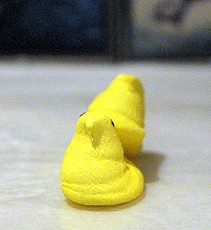The last figure of conscience, Emperor Hirohito
When discussing Emperors in Japan, it's enough to just remember the representative one, Emperor Hirohito, the most hatred and beloved Emperor holding throne throughout WWII. This article today will not discuss whether he was guilty or not of being defeatd in WWII. Such a dualism doesn't make the discussion profound. This time I'd like to focus on his personalility, and try to get the lowdown on the mystery: why did he survive?
I came across the reason, when I saw a videoclip from 1947 in Hiroshima, just two years after the atomic bomb. A small man with a hat gets out of a black car, being surrounded by refugees and neighbors who gathered up to see him. He may as well being killed there because people experienced such a devastating defeat just because of believing him. It was natural at least to see a scenery of people throwing debris at him as he was the symbol of Japanese unification.

The reaction people showed, however, was completely incomprehensive, sobbing all around with him. He took off his hat, bowing lightly, and speaking to orphants. When he went to Tokyo (1946) for consolation after air bombardment and surrender, people raised their both hands and shouted "Bansai (means viva!)" to him with no one forced them to do it. They pushed away GHQ (US soldiers) and ran toward him.

To tell the truth, people had never seen real Emperor Hirohito standing on ground because of "deification campaign" by government before the end of WWII. A picture of Emperor Hirohito on a white horse was the only him people could glimpse at. But note that the typical depiction that he was the god may convey a little misunderstanding. In European world where monotheism is the standard decipline, "the god" sounds the absolute entity. Here in Japan, we use that word indeed frequently; gods are everywhere. Dead people can even become gods after death.
Since his decision of surrender and proclamation as a human, it was the most radiative period for him until the government and massmedia made him a taboo again a decade and put him behind the curtain later. (He didn't have effective power on the cabinet because even he couldn't stop the cabinet from going to the war. It was a democratic country Japan was!)

I once thought that he would be guilty if other ministries were. But the more I get to know him, the more I want to let him be alone. Just hearing his numerous episodes, Japanese never be able to logically think about him or look him as one the the rest of ministers.
He had survived 1411 places of his consolation visits until his death. He regretted that he lost chance to visit the last place, Okinawa, where the fircest combats were taken place; he wasn't allowed to conduct this plan because of cancer.
An episode reminds me of "samurai" spirit in him: when greeting MacArthur for the first time, Hirohito begged him to save as many Japanese civilains as possible using his personal assets. MacArthur was strongly moved by his attitude. (The details are only written MacArthur's reminiscences since Hirohito never wrote about his biography. MacArthur is known to decorate his reminiscences. I am doubtful if the greeting was that beautiful. Let me know if you happened to know anything.)
People may have seen the real self-sacrificing and frugal "samurai" spirit in him, overlapping the old leaders, "samurai" who were downfallen just because they were thinking of helping poor people.
During Emperor Hirohito studied abroad in his youth, he took part in a dance party in London. Looking at Duke of Atholl dancing pleasantly with a wife of a cattleman, he mumbled, "this is the way people should be!" His character and "samurai" spirit may have been developed with such an obedient learning style from developed societies in Western Europe.
Literally, he was the last conscience for starving people.











